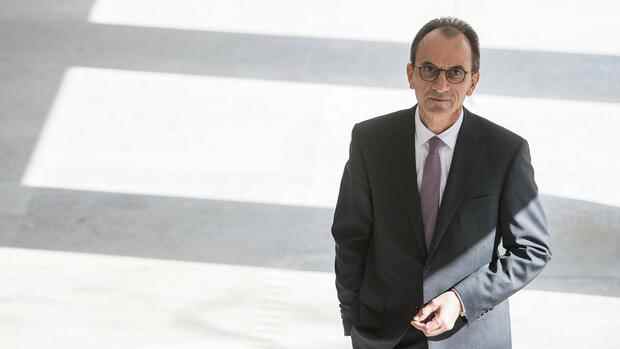The Hessian Minister of Finance has angered Deutsche Bank boss Christian Sewing with praise for the regional structures of savings banks and cooperative banks.
(Photo: dpa)
Wiesbaden The Hessian Minister of Finance, Michael Boddenberg, is in favor of more consolidation in the state bank sector. “The state banks must be efficient service providers for the savings banks,” said the CDU politician to the Handelsblatt. In the long term, there will therefore be “change processes and even greater cooperation between the institutes”.
Boddenberg points out that many in the savings bank family are of the opinion “that in the end one or two central institutes are enough to take care of the interests of the savings banks. The cooperative sector with DZ Bank can serve as a model here.”
While the Volks- und Raiffeisenbank got by with one central institution, DZ Bank, there are four larger state banks in the public sector: LBBW in Stuttgart, BayernLB in Munich, Helaba in Frankfurt and NordLB in Hanover. Both the savings banks and the respective federal states are involved in them.
Savings Bank President Helmut Schleweis has long advocated the creation of a central institute that is 100 percent owned by the Savings Banks. However, due to resistance from politicians and the Savings Banks Finance Group, he is not making any progress. Instead of merging, individual Landesbanks are now increasingly cooperating in individual business areas.
Top jobs of the day
Find the best jobs now and
be notified by email.
“We encouraged Helaba to talk to other institutes about further cooperation and the bundling of competencies,” says Boddenberg. The state of Hesse holds 8.1 percent of Helaba – and intends to retain this stake.
“Helaba is of strategic importance for the state of Hesse”
“We do not intend to sell our stake in Helaba because it is of strategic importance for the state of Hesse,” says Boddenberg. “Helaba is important for the development of the Frankfurt financial center and the savings bank sector as a whole.” It also owns the development bank WI-Bank, which plays an important role in housing construction financing in Hesse and in the lending business of the municipalities.
In February, Boddenberg praised the regional structures of savings banks and cooperative banks in Germany in a joint guest article with the Hessian Economics Minister Tarek Al-Wazir (Greens) – and called for regulatory simplification for both.
This was not well received by the German Private Banking Association BdB and its President Christian Sewing, as Boddenberg recently revealed at an event. On November 24, the BdB invited Boddenberg and Al-Wazir to a panel discussion on Germany as a financial location.
presence in the area
Boddenberg is of the opinion that a comprehensive range of banks in Germany must be maintained. “Bank branches are just as important as retailers, schools and fast internet so that life in rural areas remains attractive,” says the trained master butcher. Small and medium-sized companies, which form the backbone of the economy, also need local contacts at the banks.
“Since a large-scale presence is not economically attractive for many private banks, savings banks and cooperative banks are of great importance,” argues Boddenberg. Of course, Germany and Europe also need internationally competitive large banks that support companies with large transactions and business abroad.
The 63-year-old sees room for improvement in the development of the Frankfurt financial center. Since Brexit, more than 60 financial institutions have applied for new licenses and opened new offices in the Main metropolis. However, large parts of the trading business migrated from London to Paris.
Hessen wants to “extend its elbows” in the competition
“We have to be careful that Frankfurt is not only perceived as a location for regulation and financial supervision, but also as an attractive location for trade and financial services,” warns Boddenberg. “We have to use our elbows in competition with other locations.”
This applies to the settlement of companies as well as to the struggle for important business. For a long time, Deutsche Börse has been trying to ensure that more derivative transactions are processed in euros (euro clearing). German politicians also want the new European Anti-Money Laundering Authority (AMLA) to be located in Frankfurt.
More: “Warning shot” for the Frankfurt financial center: What the Linde farewell means for the Dax
